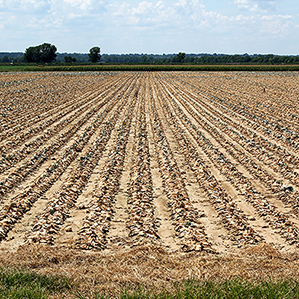U.N. Climate Report Warns of Increased Risk to Crops
A few years ago scientists thought climate change wouldn’t cause much harm to overall food production until temperatures in a region rose by three to four degrees Celsius compared to current levels. But in the latest United Nations report on climate change, released today, scientists have revised those estimates, pointing to significant losses with a temperature rise of just two degrees Celsius.

The report is part of the Fifth Assessment Report from the Intergovernmental Panel on Climate Change, a group of 837 researchers from around the world who assess and summarize the scientific literature on climate change. The fourth assessment report came out in 2007, and since then scientists have accumulated far more data, revised their computer models, and done more to study how factors such as changes in precipitation and extreme weather interact.
Changes in crop yield—the amount of produced per hectare—are only one part of the current report, which has over 30 chapters. But the changes in scientists’ estimates of how climate change will affect agriculture are some of the most remarkable in the report. The report, looking at the major food crops of corn, wheat, and rice, says that yields are likely to start decreasing by 2030 and decline up to 2 percent a decade (climate change seems to be affecting crops already, but so far this has been offset by improvements in crop yield). Such a reduction in yield is particularly worrying because demand for food is expected to increase in coming years, at a rate of about 2 percent a year.
Assessing how climate change will affect crops is tricky. Increased concentrations of carbon dioxide, changes in temperature and precipitation, the increased frequency of extremely hot days, and changing patterns of crop disease all play a role. In some areas, climate change could help improve production—growing seasons may improve in cold areas, for example. But scientists are finding that even with current levels of warming, the negative impacts of climate change are more common. And as the climate continues to change, the negative impacts are expected to get worse.
One of the biggest uncertainties around food production is how humans will adapt. Improving farming practices, breeding new strains of crops, and even genetically engineering plants could help improve yields (see “Why We Will Need Genetically Modified Foods”). However, any negative effect on agricultural production could have dire consequences for food prices and could be especially painful to poor populations. The new report notes that prices have increased rapidly as a result of droughts and other events potentially related to climate change.
The report released today is from the IPCC working group two, which is focused on analyzing the impacts of climate change and options for adapting to changing climates. The report from working group one, which looks at the physical science basis for climate change, came out in September. A report on how climate change can be limited will come out next month.
Keep Reading
Most Popular
Large language models can do jaw-dropping things. But nobody knows exactly why.
And that's a problem. Figuring it out is one of the biggest scientific puzzles of our time and a crucial step towards controlling more powerful future models.
How scientists traced a mysterious covid case back to six toilets
When wastewater surveillance turns into a hunt for a single infected individual, the ethics get tricky.
The problem with plug-in hybrids? Their drivers.
Plug-in hybrids are often sold as a transition to EVs, but new data from Europe shows we’re still underestimating the emissions they produce.
Stay connected
Get the latest updates from
MIT Technology Review
Discover special offers, top stories, upcoming events, and more.